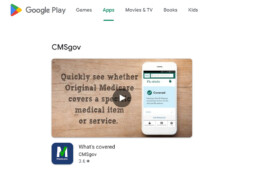What Tests or Procedures Are Covered Under Medicare?
A doctor tells you that you may need a test or procedure done and, after leaving the office, you begin to worry if that test is covered under your Medicare plan. This is a worry for everyone but especially for new people coming into Medicare. Having seen many things denied, or having gotten into a fight with their commercial insurance company prior to joining Medicare, it is understandable that this worry comes up. Did you know that there is a Medicare app called “What’s Covered?” that is available on both the Apple Store and Google Play?
This app allows you to search procedures and tests already listed in their database and allows you to type in procedures by name. It also covers preventive services and the frequencies in which you may have them done. Some services do require your Medicare participating physician to get a pre-authorization before the service is done. It never hurts to make sure they have done so.

As for coverage with your Medicare Supplement Plan – if Medicare covers the service and has pre-authorized it for you (again check with your doctor) then your Medicare Supplement plan must also pay the remaining balance. The Supplement cannot say “No!”, to a Medicare approved service.
Medicare Advantage plan members are the exception...
Medicare Advantage plan members are the exception...
If you are covered under a Medicare Advantage plan, this application won’t be accurate for you. While you are still part of the Medicare system, it is up to the commercial insurer who offers you coverage under the Part C Medicare Advantage Plan, whether it will be covered or not. In that case always check with your physician and your insurer if you have any questions on whether a test or procedure is covered and how it will be covered.
A BIG change for families that can make their health coverage more affordable on Pennie
When purchasing health insurance, whether it is through an employer plan or through Pennie or directly through an insurer, it is sometimes hard to understand where the term “affordable” fits into the “Affordable Care Act”. When a family has an individual who is covered through an employer plan and other members of the family were able to get coverage through that plan (even if they had to pay full price – which is most often the case anymore) then no one in the family qualified for an Advanced Premium Tax Credit through Pennie, or the Federal Marketplace. That is now changing!

FOR AWARENESS:
Under new federal rules, Pennie can now provide savings to more Pennsylvanians!
Learn more below:
What happened?
In October, the Biden administration finalized a rule changing how affordability is calculated for family members with an offer of health insurance through their spouse or parent’s employer.
What was the problem?
Until now, affordability of employer health insurance for family members was based on the cost to enroll only the employee, regardless of the cost of family coverage. Even if the cost to enroll family members was significantly more than the cost to enroll the employee, the coverage was still considered “affordable” for the family members, making them ineligible for financial assistance through marketplaces like Pennie.
This so-called “family glitch” forced family members to choose between two expensive options, the employer family plan or a full price marketplace plan.
What is the new solution?
Under this new rule, starting with 2023 coverage, family employer plans will only be considered “affordable” if the actual cost to enroll each member of the family is within the ACA affordability standards. In other words, when employer coverage for family members costs too much, the family members may qualify for financial assistance through Pennie, instead of being forced to pay full price.
Pennie’s application has been updated to include a new question for all members of a tax household with an offer of family coverage through a spouse or parent’s employer. Each tax dependent will be asked to provide the premium of the lowest cost family plan (employee + spouse + other dependents). Pennie will then determine for each family member whether that employer coverage is affordable to determine whether each person may be eligible for savings through Pennie. The employer coverage may be affordable for some family members but not others, resulting in only some family members being eligible for financial savings.
Communication to the Impacted Population at Pennie:
Pennie will be emailing and calling those customers and applicants who previously indicated on their application they had an offer of family coverage from their spouse or parent’s job. These customers will be asked to update their application to provide the additional information about the cost of employer-sponsored coverage, to determine if they may be newly eligible for financial savings.
The “family glitch fix” question will be available to all Pennie customers who submit a new 2023 application, or who update their existing 2023 application, ensuring they get access to the financial savings they qualify to receive.
Binding Arbitration and How It Affects You, Your Health Insurance, and Your Health Care
We are all accustomed to page after page of legal jargon in every contract we sign. It doesn’t make any difference if you are buying a rug, a cell phone, or health insurance or healthcare from a provider, you are now faced with a mountain of words that virtually no one ever reads because it is long, drawn out, and in language that is designed to confuse and cloud what you are signing. It is also usually in small type that makes it difficult or impossible to read. The effect being most people ignore it and sign away their rights!
Please take a look at the disclaimer used on the Website for individual and family health insurance in Pennsylvania:
In addition, I understand that, if I select a health plan that uses mandatory binding arbitration to resolve disputes, I may be agreeing that any dispute between myself, my heirs, relatives or other associated parties on the one hand and the health plan, any contracted health care providers, administrators, or other associated parties on the other hand, including any claim for medical or hospital malpractice or relating to the coverage for, or delivery of, services or items, irrespective of legal theory, must be decided by binding arbitration and I agree to give up the right to a jury trial. I understand that the full arbitration provision is in…
The information about the binding arbitration clause is in a document that cannot be found on that website and is particular to each insurer. Even if you are signing up for a plan directly through the insurer that clause is not easily found. Why does this make a difference to you? Binding arbitration means that a private arbitrator, agreed to by you and the insurer or provider is selected. There will be no jury trial. You have to wonder who is going to have more power in that selection process? This clause is stating that you give up the right to a jury trial relating to malpractice, and other offenses, and so do your family members and their heirs.

By signing a binding arbitration clause, you essentially waive your right to choose to go to court if something goes wrong. Encountering one of these clauses isn’t necessarily a reason not to use a doctor, or sign with an insurance company for a health plan that otherwise meets your needs. But it’s worth understanding what binding arbitration means for you, and what to look for, and ask, before putting pen to paper.
“This is a contractual agreement by which two parties, maybe more, agree to waive the opportunity to go to court and appear before a judge and jury.
“This is a contractual agreement by which two parties, maybe more, agree to waive the opportunity to go to court and appear before a judge and jury.
“This is a contractual agreement by which two parties, maybe more, agree to waive the opportunity to go to court and appear before a judge and jury. Instead, you resolve any dispute by a private arbitrator,” explains Ramona L. Lampley, associate dean of academic affairs and professor of law at St. Mary’s University School of Law. Many times, binding arbitration also prohibits multiple people from combining claims into a single lawsuit, adds Judith Resnik, the Arthur Liman Professor of Law at Yale Law School.
It’s not clear how many insurers and providers make patients sign binding arbitration clauses, but experts say they’re increasingly common. One likely factor is the growing number of healthcare practices owned by liability insurance providers or health systems. Binding arbitration is thought to be a way to lower providers’ legal fees and reduce payouts to patients who sue for malpractice. (Although some legal experts argue that arbitration doesn’t actually save providers money.)
What binding arbitration means for patients
While the people or companies who own medical practices and insurers may benefit from binding arbitration, that’s not necessarily the case for patients. When you use arbitration to resolve a dispute, you go before one or a panel of arbitrators instead of a judge and jury. Arbitrators might be lawyers or former judges, and they’re supposed to be impartial. Most contracts designate an arbitrator.
First, “look to see if a reputable, unbiased service [such as JAMS] is designated,” Lampley says. She advises patients to research the company that is being suggested as the arbitrator and see what their affiliations are.
If the designated arbitration service doesn’t seem reputable, carefully consider whether or not to sign your name. The same advice is also very important if the clause either doesn’t specify who chooses the arbitrator or says something like, “The arbitrator will be unilaterally selected by the drafter of the agreement.” What does that mean to you?
Being more proactive but it is often worth the time and effort to make sure your case is fairly treated.
Being more proactive but it is often worth the time and effort to make sure your case is fairly treated.
“If the arbitrator is a person to whom the provider regularly sends business, one might argue the arbitrator has an unconscious incentive, or bias, to rule in that party’s favor, in order to keep getting the business,” Lampley says. If you suspect bias, you can ask the provider to explain who the designated arbitrator is and what sort of relationship they have. Again this means that you have to be more proactive but it is often worth the time and effort to make sure your case is fairly treated.
Arbitration tends to be quicker than a trial. But that’s partly because it involves a more limited discovery process, meaning the period when a plaintiff and defendant share information that’s relevant to the case. Sometimes, an arbitration clause spells out the discovery rules; other times the designated arbitrator posts the rules on their website. Yet in other instances, discovery rules aren’t established until a case begins. These variations are another reason to read paperwork closely.
As for the cost to patients, arbitration is often, but not always, cheaper than going to court. “In a high-damage medical malpractice case, you can find an attorney who will represent you on a contingency fee, usually 25 to 30 percent of your total recovery,” Lampley says. “So there’s no out-of-pocket at the outset, and if you lose, there’s no payment, generally.” Plus, arbitration payouts tend to be lower. On the other hand, for low-value claims that aren’t worth the cost of suing in court, arbitration can provide a useful alternative pathway to recovering damages, says Lampley, adding that you often don’t need a lawyer to arbitrate a claim that’s only a couple thousand dollars.
Also know that, with arbitration, you have a limited right to appeal, if you have any right.
Also know that, with arbitration, you have a limited right to appeal, if you have any right.
Lastly, many companies prefer arbitration because it shields them from public scrutiny. While some patients also see this relative privacy as a plus, others want their day in court. “There is power in having a case heard by a jury,” says Lampley. “It’s a cathartic experience.” Also know that, with arbitration, you have a limited right to appeal, if you have any right.”

Knowing what you have signed, and demanding clearer, less verbose, and easier to understand clauses that are stated in the beginning of any signature process may shine a light on “binding arbitration clauses”.
Ways To Help With The High Cost Of Prescription Drugs
Have you ever felt that your money was being ripped out of your hands when you had to fill prescriptions at pharmacies? While there are no fool proof answers to the problem, whether you have individual insurance, Medicare prescription insurance, or even many group plans, the costs are prohibitive for many of the most commonly prescribed brand name and high-cost generic drugs. There are some options to look at however though some may mean having to do a bit of work.
It takes people making noise to make a difference.
It takes people making noise to make a difference.
Most people are now familiar with drug discount programs like Good RX, Single Care, and Script Saver. Many have also heard of “Cost Plus Drug”, an online pharmacy began by Mark Cuban that is actually starting to team up with insurance companies in Pennsylvania like Capital Blue Cross**. This may be something that you would want to write to your current health insurance or prescription drug plan about. It takes people making noise to make a difference. I keep running into too many people being willing to say, “What can I do about it?”. You can make noise about the ridiculous pricing of medications in the United States not only to your insurer but also to your representatives in both the state and federal Congress! They will listen if enough people complain but they won’t do anything if you keep silent!
Another big suggestion I constantly make to my clients is to form a relationship with a small independent pharmacist. You cannot help yourself more than by doing that. A small, independent pharmacist has more control over their costs than a pharmacist in a “big box store” that is corporately owned. Studies over the years have consistently shown that small, independent pharmacists overall cost the public less versus the major corporate pharmacies and big box stores when it comes to more expensive drugs. The reason for this is that they can set their own pricing. They will never come out the lowest in cost on Medicare.gov comparisons because you can’t negotiate pricing on that site.

Form a relationship with a small pharmacy
Form a relationship with a small pharmacy
My suggestion is to form a relationship with a small pharmacy and then ask them what they would charge you if you didn’t use your prescription drug card from your insurance at all for your medications. It may not work out the best for very low-cost drugs, because the big box stores negotiate those low-cost drugs at little to no cost to consumers as a way to attract business. Unfortunately, they often have very high pricing for mid-level and higher drugs. Smaller pharmacies may offer home delivery, medication consultations, will talk with your doctor about alternative medications that may be less costly, and have the time to spend with you because they are not under corporate pressures.
Call or email me with any questions. I hear over and over again that the cost of medications are just too high and the government is not doing enough, fast enough, to make the costs less for Americans.
Just a few months since announcing our collaboration with Mark Cuban Cost Plus Drug Company (Cost Plus Drugs), we’re expanding it! Starting January 1, 2023, Cost Plus Drugs will begin accepting Capital Blue Cross prescription drug coverage.
Capital Blue Cross was the first health plan in the country to collaborate with Cost Plus Drugs, helping our members and communities gain greater access to low-cost prescription drugs and transparent pricing. Now, our prescription drug plan members will be able to add their Capital ID card number to their Cost Plus Drugs online account to apply their benefits. Using Cost Plus Drugs is easy.
Cost Plus Drugs is affiliated with billionaire Mark Cuban, who’s working to disrupt the drug industry by offering substantially discounted pricing on a wide range of commonly used generic drugs. Discounts can be as large as 80% below retail!
All costs (except expedited shipping) are included in the cost of each drug on the Cost Plus Drugs website. Pricing is consistently based on: the cost they pay for a drug; plus 15% (to pay for running their business); a pharmacy charge for dispensing the drug; and a charge for standard shipping.
The Sandwich Generation on Serving Aging Parents
It’s nearly impossible to read all of the health insurance information available to you. We know; we’ve already read most of it!
If you’re over 50, there’s a good chance you’ve spent the last few years trying to figure out how to help your parents with their Medicare questions while wondering if your own coverage is still right for your changing household dynamics.
This is exactly the right time to ask questions and explore your options! Whether you want to make sure your aging parents have the right coverage, or you want to start preparing for your own Medicare plan.





